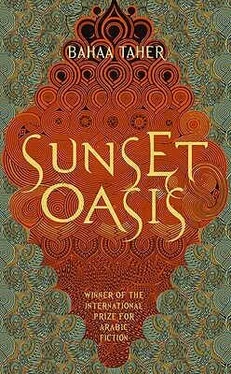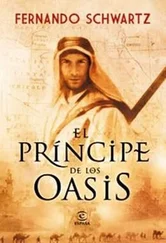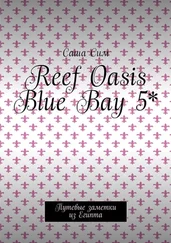Bahaa Taher - Sunset Oasis
Здесь есть возможность читать онлайн «Bahaa Taher - Sunset Oasis» весь текст электронной книги совершенно бесплатно (целиком полную версию без сокращений). В некоторых случаях можно слушать аудио, скачать через торрент в формате fb2 и присутствует краткое содержание. Год выпуска: 2009, Издательство: Sceptre, Жанр: Современная проза, на английском языке. Описание произведения, (предисловие) а так же отзывы посетителей доступны на портале библиотеки ЛибКат.
- Название:Sunset Oasis
- Автор:
- Издательство:Sceptre
- Жанр:
- Год:2009
- ISBN:нет данных
- Рейтинг книги:3 / 5. Голосов: 1
-
Избранное:Добавить в избранное
- Отзывы:
-
Ваша оценка:
- 60
- 1
- 2
- 3
- 4
- 5
Sunset Oasis: краткое содержание, описание и аннотация
Предлагаем к чтению аннотацию, описание, краткое содержание или предисловие (зависит от того, что написал сам автор книги «Sunset Oasis»). Если вы не нашли необходимую информацию о книге — напишите в комментариях, мы постараемся отыскать её.
Sunset Oasis — читать онлайн бесплатно полную книгу (весь текст) целиком
Ниже представлен текст книги, разбитый по страницам. Система сохранения места последней прочитанной страницы, позволяет с удобством читать онлайн бесплатно книгу «Sunset Oasis», без необходимости каждый раз заново искать на чём Вы остановились. Поставьте закладку, и сможете в любой момент перейти на страницу, на которой закончили чтение.
Интервал:
Закладка:
It occurred to me that everything I had done in life flew in the face of what he had taught me. He had dreamt of a middling country, neither too large nor too small, so that its governance would be easy. I, though, had built an empire as big as the world. He had wanted too a middling government, composed neither of the rich nor of the common people but of wise middling people. What would he have made of the government of the god-hero who united the whole world under his rule? And he had wanted a middling happiness, between excess and renunciation, the arbiter of whose boundaries is the rational mind. I used to ask myself, 'Where in the world, my old teacher, can one find this well-governed life, other than in the garden of your Academy, where you can enjoy talking about it with your students as you walk in the shade of the trees, back and forth?'
All these lessons were swept aside by my visit to Amun and my meeting with the Egyptian priests who spoke in the name of their divinities.
There, I learnt that fear, not wisdom, is the basis of rule. I learnt that one must make the common people live in constant fear of punishment and torment on Earth and in Heaven so that they may know obedience and righteousness. I learnt that the ruler must not allow freedom or pleasure for the common people but must teach them to find pleasure in fear. They must worship me in fear and through fear. That was the most valuable lesson I learnt from Amun and the Egyptians. I applied it and it worked, not just in Egypt but everywhere. I could hear the echo of the insane shouts of the Egyptians, their voices tremulous with tears, for their pharaoh Alexander, in other shouts in other parts of Asia for the new conquering god.
And naturally I also found that small group of rebels who dreamt of freedom, and these were generally taken care of by the common people themselves before I had to take care of them, the commoners uncovering their plots and rejoicing at their fall because those dreamers would have robbed them of the luxury of their peace-of-mind-in-fear.
I will never forget one of those rebels, a youth of sixteen, one of the Macedonian noblemen's sons who used to guard my tent, the last from whom I expected betrayal, and yet they did it. One of them denounced the others for plotting against my life, so I ordered them all seized.
This boy, their leader, dared to stand up in front of me and challenge me as I interrogated him.
He said, 'You ask as though you didn't know! Yes, we plotted against you, because you no longer conduct yourself as a king with subjects who were born free men but as a tyrant with slaves. You want the Macedonians to kneel before you and worship you as a god and you even deny your own father, Philip. So how can it astonish you that we cannot stand your conceit?'
As though the child were my teacher! How could a boy like him comprehend my divine plan for the glory of Macedonia and the peace of the world? He may have thought that he would move me when he said, 'Take us straight away to the execution field, that we may gain by our death what we sought to gain by yours!'
Naturally, I sentenced him to be killed, along with the rest of his rebellious companions, after torture on the wheel, where their bones were crushed and broken.
Then, after the execution, came, as usual, the seclusion and the regret. Alexander the God-Emperor disappeared and a pitiful Alexander took his place.
In my seclusion, the image of that courageous youth would not leave me. I realized that he had spoken only the truth. Yes, of course, I was a tyrant, no matter what justifications I might find for my tyranny. I ruled my subjects by fear, and fear gave birth to obedience as I wanted, but also to betrayal. Those closest to me betrayed me and plotted against me time after time. Not one of them found the courage of that boy when he confronted me with his words, perhaps because they were not betraying me for a principle but out of greed to inherit my power. Why, though, did that other boy, his companion, betray him and denounce him and the rest of his companions when he knew he was delivering them to torture and death? Was that fear too, or greed?
I thought long but could not discern the starting point in the chain of tyranny, fear and betrayal. Which gave birth to which? And was I truly the one who fashioned it, or one of its victims?
In my seclusion, during which the image of the murdered young man was my constant companion, the many images of Alexander disappeared and all that remained was one Alexander, who realized that he had reached the end of his path. I had experienced everything — victory and glory such as had blessed no one before me and the gratification of governance and power, pardoning as a god and killing as a man — and I had experienced the ecstasy of poetry and music, the indulgence of women and wine. So why hadn't I achieved happiness?
For what remained of my life, I tried to live the happiness of men, not that of the gods. During my life I had known women and loved them; Roxana, my Persian wife, was the closest of them to my heart. I didn't live with her that transcendent love for which a man may sacrifice the whole world, like the love of Paris for Helen in the Iliad, which ignited the Trojan War, but my love for Roxana was calm and deep. I also lived true friendship with Hephaestion, and this was my consolation in what remained of my life. It was a friendship that meant that the two of us were one. Once, the mother of Darius, when she had become our captive, mistakenly fell on her knees before him, entreating him to spare her life, for she thought he was the king. When they indicated that she should direct her words to me, I told her not to be ashamed for he too was Alexander.
I wasn't lying. I truly felt that Hephaestion was the best of all those Alexanders who lived inside me. Aristotle would probably have liked him. He lived quietly and moderately and didn't get angry, and he knew nothing of the madness that pursued me throughout my life. He was, however, able to understand that madness and forgive. When I looked into his eyes, I knew that he understood all my contradictory actions and understood the bewilderment that pushed me to perform them, which I myself never understood.
But he departed before his time. The sickness came upon him at the start of the return march from Asia to the West, when we stopped at the city of Babel, and there he met his end.
His death left me certain that Alexander the Man had gone for ever, and that the other broken pieces that jostled within me and whose presence terrified me were biding their time. So I decided that I would not live with these distorted creatures, now that Hephaestion had taken with him the peace that he had been unable to pass on to me, and so bring these severed limbs together into a harmonious mortal whole. I tried to take care of it myself by throwing myself in the river, but my faithful Roxana saved me.
I found myself utterly alone, but while in Babel I had to oversee my last campaigns before the return to Europe. I determined to explore the last unknown land of Asia, that vast desert where the Arabs dwell. I readied the fleet that was to discover their peninsula, but an inner voice told me that I would not complete even this last task in Asia.
After Hephaestion, I contemplated the meaning of the things that had determined my life.
Amun inducted me into the ranks of the immortal gods and I believed in that, so I behaved as a god and tried to recreate the world and mankind. From time to time I would remember the lessons of Aristotle and a wave of self-doubt would sweep over me regarding what I was doing; the wounds of the immortal gods do not bleed, they know no pain, and they do not attempt suicide out of regret or despair — and I tried to end my life at least twice.
That may have been the third time, when I drank to excess at a banquet put on by some garrulous friend in Babel. He kept urging me to continue drinking, even after I had become fatigued and sick. Why would I have obeyed him had I not wanted in the depths of my soul to be done? Following the banquet I was stricken by the fever that put an end to my life in days.
Читать дальшеИнтервал:
Закладка:
Похожие книги на «Sunset Oasis»
Представляем Вашему вниманию похожие книги на «Sunset Oasis» списком для выбора. Мы отобрали схожую по названию и смыслу литературу в надежде предоставить читателям больше вариантов отыскать новые, интересные, ещё непрочитанные произведения.
Обсуждение, отзывы о книге «Sunset Oasis» и просто собственные мнения читателей. Оставьте ваши комментарии, напишите, что Вы думаете о произведении, его смысле или главных героях. Укажите что конкретно понравилось, а что нет, и почему Вы так считаете.












